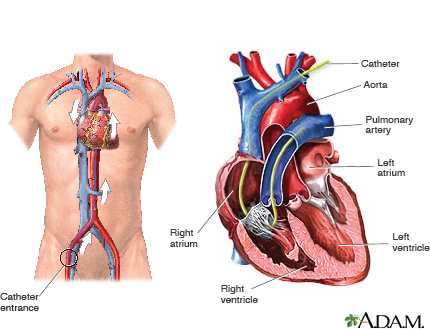How is PAH diagnosed?
The symptoms of PAH are similar to the symptoms of other, more common diseases, such as asthma or other lung diseases, and various heart diseases. If you think you are experiencing symptoms of PAH, talk to your healthcare provider.
To diagnose PAH, your healthcare provider will need to obtain a thorough medical history, a physical exam, and results from certain tests and procedures.
Common tests include:
-
6-minute walk distance (6MWD)
- This test is a measure of how far you can walk in 6 minutes
-
Pulmonary function tests, also called spirometry or lung function
tests
- In these tests, you breathe into a mouthpiece that is connected to a device that measures how much and how fast you can breathe in and out
- Chest X-ray
-
Echocardiogram
- This test uses sound waves to create images of the heart as it pumps. The images are much more detailed than X-rays
- Blood tests
-
Ventilation/perfusion scan, also called V/Q lung scan
- This test captures images of air and blood circulation in all areas of the lungs
Test to confirm PAH diagnosis: Right-heart catheterization
If the preliminary tests indicate PAH, a right-heart catheterization will be done to confirm the diagnosis and to assess how severe the PAH is.
Right-heart catheterization involves inserting a long, thin, flexible tube called a catheter through the blood vessels and into the heart. This procedure allows your healthcare provider to test heart function and blood pressure in the heart and lungs.
This is the only test that can absolutely confirm a PAH diagnosis, and it will only be performed if the preliminary tests have shown results that suggest PAH.
Click here to see how right-heart catheterization is performed.
Important Safety Considerations for ADCIRCA® (tadalafil)
- You should discuss all of your medical conditions and all medications with your healthcare provider before starting ADCIRCA
- Do not take ADCIRCA if you take any medications that contain nitrates (often used for chest pain) or guanylate cyclase stimulators, as the combination could cause a sudden, unsafe drop in blood pressure
- Do not take ADCIRCA if you are allergic to tadalafil or any other ingredient in ADCIRCA
- ADCIRCA is a type of medication called a phosphodiesterase 5 inhibitor (PDE-5i) that can cause blood vessels to widen, which may result in a decrease in blood pressure. If you have heart-disease or any problems with low blood pressure, tell your healthcare provider before taking ADCIRCA, as these conditions may be affected by the action of ADCIRCA
- Talk with your healthcare provider if you are pregnant or planning to become pregnant or if you are breastfeeding or plan to breast feed.
- If you have ever had blockage in the veins of your lungs, known as pulmonary veno-occlusive disease (PVOD), ADCIRCA is not recommended for you
- Taking ADCIRCA with alcohol, or blood pressure medications, such as alpha-blockers, may lower blood pressure and cause hypotension (light-headedness or fainting)
- Do not take ADCIRCA if you are taking rifampin (an antibiotic for certain bacterial infections), or antifungal medications, such as ketoconazole and itraconazole. If you require treatment with both ADCIRCA and ritonavir (Norvir®) at the same time, your dose of ADCIRCA will need to be adjusted. Inform your healthcare provider if you have kidney or liver problems before taking ADCIRCA
- ADCIRCA contains the same ingredient (tadalafil) as Cialis®, which is used to treat erectile dysfunction (ED, impotence) and the signs and symptoms of benign prostatic hyperplasia (BPH, enlarged prostate). If you are taking ADCIRCA, do not take Cialis or other PDE-5is
- In rare cases, patients reported side effects such as decreased eyesight or loss of vision in one or both eyes (NAION), or sudden decrease or loss of hearing, sometimes with ringing in the ears and dizziness. If you experience any of these side effects after taking ADCIRCA, seek medical attention right away
- In rare cases, men taking PDE-5is (including tadalafil) for erectile dysfunction reported side effects such as an erection lasting more than four hours. If you experience a prolonged erection, seek medical attention right away
- The most common side effects of ADCIRCA are headache, muscle pain, getting red or hot in the face (flushing), nausea, pain in the arms, legs or back, upset stomach, stuffy or congested nose
ADC.ISI.CON.SEP2020
For more information about ADCIRCA, please see the
Full Prescribing Information
and
Patient Information
or call 1-800-545-5979.
Call your healthcare provider for medical advice about side effects. You are encouraged to report negative side effects to the FDA at www.fda.gov/medwatch or call 1-800-FDA-1088.
